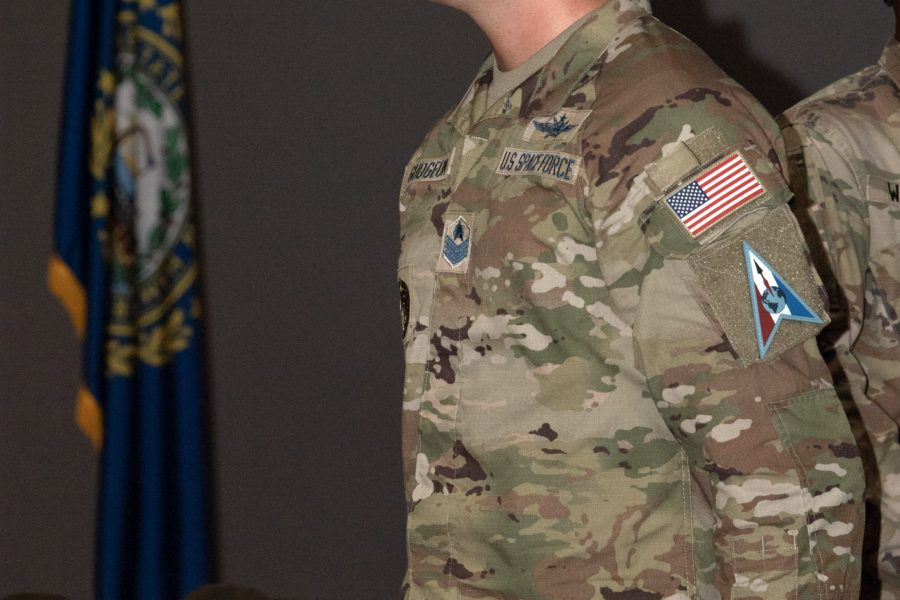
First Ever Guardians Graduate Army Drill Sergeant Academy—and May Not Be the Last (Image Credit: airandspaceforces)
Two Guardians broke new ground last week when they become the first members of the Space Force to graduate from the Army Drill Sergeant Academy. Now, Tech Sgt. David Gudgeon and Sgt. Yuji Moore are ready to bring their unique experience to the Space Force’s training process for transforming civilians into service members.
What’s more, with two Guardian Drill Sergeants now donning the Army’s iconic “Brown Round” campaign hats, the service hinted at more cross-branch training for its Guardians instructors in the future.
Army Drill Sergeants, just like Military Training Instructors in the Air Force and Space Force, are tasked with training new recruits in basic combat skills, military protocols, and beyond. Space Force recruits attend the Air Force’s Basic Military Training course, with added space-specific curriculum.
The Air Force trains its MTIs at Joint Base San Antonio-Lackland in a 35-day course. The first Space Force graduate of that school was in September 2021.
The Army Drill Sergeant Academy, located in Columbia, S.C., includes a 540-hour, nine-week course, training noncommissioned officers to teach civilians how to become Soldiers. The program assesses various skill sets including tactics instruction, proficiency with weapons, and leading a squad in a 48-hour overnight field training exercise.
“The biggest takeaway for me was seeing how controlled stresses and failures worked in an environment with tight timelines and manageable failures,” Gudgeon told Air & Space Forces Magazine. “This effectively built the resiliency and leadership we were looking for.”
Moore said what stood out to him was “the importance of being a coach, leading through tactics and procedures, and being part of the team rather than just instructing. The Army’s field exercises emphasized this approach, with drill sergeants actively participating alongside the trainees.”
Maj. Clinton Emry, commander of 1st Delta Operations Squadron/Detachment 1, said the Army Drill Sergeant Academy was happy to collaborate with the Space Force after already training personnel from the Hungarian Defense Force, South Korean Army, Croatian Army, and British Army.
“This is a unique moment in history where the USSF has Military Training Instructors certified by the USAF and we also have Space Force Drill Sergeants,” Emry told Air & Space Forces Magazine. “By having both under one training unit now, we are positioning ourselves for a more deliberate training experience for the newest Guardians coming to Space Force Basic Military Training.”
Emry described Gudgeon and Moore as “highly qualified Guardians that also had a willingness to be bold and take on a new challenge.” The two initially enlisted in the Air Force before transitioning to the Space Force. Adjusting to another new military culture in the Army wasn’t easy.
Moore said he was not always familiar with the Army’s way of doing things, such as tactics or doctrine, and had to rely on his battle buddies for questions. Fortunately, his fellow candidates helped him feel unafraid to “ask those questions and they made the environment very conducive for me to feel comfortable, to be kind of vulnerable and be the new guy there.”
Despite these concerns, the Guardians excelled academically—Gudgeon receiving a cumulative score of 96 percent and Moore of 99 percent, Army Sgt. 1st Class Brandon Hickey, Chief of Training at the Academy told Air & Space Forces Magazine.
They also gained crucial insight into Army culture—a critical skill given that Soldiers continue to transfer into the Space Force
“I think we’re definitely going to be bringing in a different flavor to that training environment that they haven’t seen yet,” Gudgeon said.
For the rest of the Space Force, Gudgeon and Moore are paving the way for further collaborations with the Army—and other branches.
“Based on our mission needs and partnerships, the sky is no longer the limit,” Emry said. “As our Space Force BMT curriculum changes and adapts over time, we must partner with other services to learn their best practices and not try to develop everything alone. Each of the services has its own culture and focus areas that they specialize in, some of those specialties are transferable to our Space Force operations, education, and training methods.”








